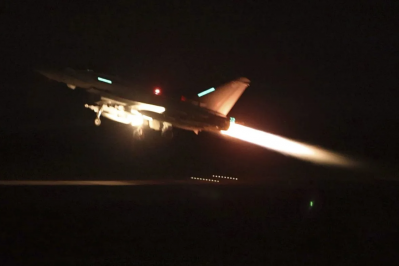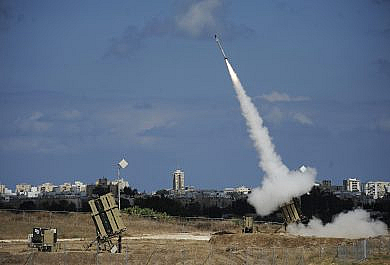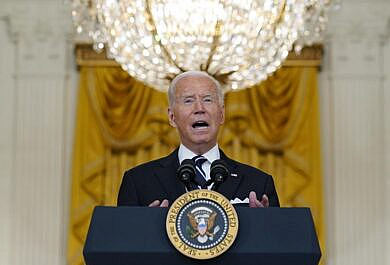American and British forces launched significant retaliatory airstrikes against 60 targets spread across 16 sites in Yemen used by the Houthis, a militant group backed by Iran, to target international shipping and US naval assets in the Red Sea.
Summary
American and British forces launched significant retaliatory airstrikes against 60 targets spread across 16 sites in Yemen used by the Houthis, a militant group backed by Iran, to target international shipping and US naval assets in the Red Sea.
- “These strikes are in direct response to unprecedented Houthi attacks against international maritime vessels in the Red Sea — including the use of anti-ship ballistic missiles for the first time in history,” said President Joe Biden in a written statement after the strikes. “I will not hesitate to direct further measures to protect our people and the free flow of international commerce as necessary.”
- The strikes targeted the Houthis’ command and control infrastructure, supply depots and launching systems. Witnesses told Reuters that explosions were seen at military bases in Yemen’s capital of Sanaa, a naval base on the red sea and military sites along the Yemeni coast.
- The Houthis claimed the bombings killed five people and wounded six others and vowed to continue their attacks on ships traversing the Red Sea that began last November.
- Global oil prices surged by 4% on Friday morning, the day after the attacks. Even so, global stock markets were resilient and were largely unchanged.
- Around 12% of global trade goes through the Red Sea each year, a huge portion of the global economy and a key part of international supply chains. Shipping firms have redirected their assets from the Red Sea to avoid the Houthis’ attacks, adding 10 days and millions if not billions of dollars in shipping costs that will eventually be passed down to consumers.
![]()
- The New York Times provided background information on the Houthis, who “have built their ideology around opposition to Israel and the United States, seeing themselves as part of the Iranian-led ‘axis of resistance,’ along with Hamas in the Gaza Strip and Hezbollah in Lebanon.”
- The Intercept reported a smattering of legislators of both parties who called the strikes unconstitutional. Left-wingers like Reps. Rashida Tlaib, Ro Khanna, Barbara Lee and Mark Pocan, despite previous support for policies like Biden’s student loan debt transfer scheme that the Supreme Court threw out as unconstitutional, claimed the strikes were illegal. GOP Reps. Matt Gaetz, Thomas Massie and Marjorie Taylor Greene all concurred with the progressives.
- NBC News noted the Houthis’ attacks on Red Sea shipping have “disrupted or diverted more than 20% of global shipping,” at an estimated cost of some $200 billion in international trade. NBC News pointed out the Houthis only claim to target “ships linked to Israel,” but this “has been widely disputed.”
![]()
- “The American and British enemy bears full responsibility for its criminal aggression against our Yemeni people, and it will not go unanswered and unpunished,” said Houthi spokesman Yahya Saree per the New York Post. Another spokesman called the strikes “treacherous aggression” – and vowed to continue the attacks on international shipping that prompted the strikes.
- National Review’s Luther Ray Abel argued it was “about time” the US and allies laid “waste” to Houthi facilities in Yemen. Abel noted the mission was “No small undertaking, the coalition forces used all available modes of attack to deliver overwhelming force to multiple locations almost simultaneously — a testament to the firepower of friendship.”
- Fox News reported Iran, the chief sponsor of the Houthis, and Russia, who’s armed forces are currently waging a war of aggression in Ukraine, had the wherewithal to criticize the US-UK joint airstrikes as “irresponsible.” Iran, who sponsors a network of terrorist groups throughout the Middle East, claims the strikes would “only contribute to insecurity and instability in the region.”
© Dominic Moore, 2023






